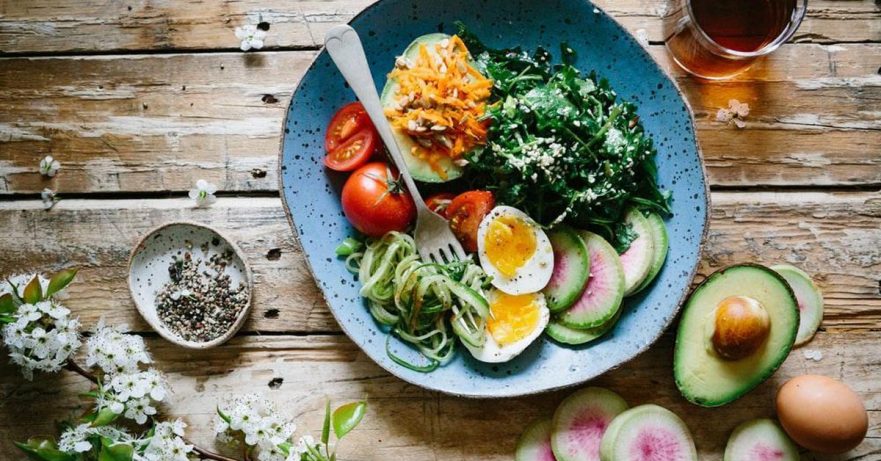what to eat with gestational diabetes during pregnancy
By Lillian Yang
Getting diagnosed with Gestational Diabetes while pregnant can be scary and overwhelming at first. As a nutritionist, I want to help you feel more confident in making healthy choices about how to eat and what to eat to feel your best and support your growing baby. A little bit of education and understanding what Gestational Diabetes means for you and your pregnancy goes a long way. It’s not all bad, and you can still eat the foods you enjoy!
What is Gestational Diabetes?
Gestational Diabetes, or GDM, means that you have elevated blood sugar that is first recognized during pregnancy (you do not have a history of diabetes). The goal will be to manage your blood sugar levels and the good news is you can usually do so without any medication. The key is to focus on your lifestyle and eating habits. It won’t be a perfect process (and it doesn’t have to be!), but it is important to maintain good blood sugar to promote a healthy pregnancy. Of course, your healthcare provider will be helping you monitor your GDM levels to help you stay on track.
Goals
Typically, we want to keep your blood sugar between 70-95 mg/dL in the mornings (before breakfast), and less than 140 mg/dL about 1-2 hours after meals. We can manage these numbers by monitoring how much “sugar” or carbohydrates you are eating at each meal.
Nutrition Basics
Your blood sugar goes up and down throughout the day. It will increase if you eat food with carbohydrates (such as oatmeal, fruit, and pasta); it will decrease with time, drinking water, and exercise. Carbohydrates aren’t all bad though! They are an important source of nutrition and energy for you – what we want to focus on are what kinds of carbs are better, and how much is appropriate for you?
So… what’s a carbohydrate anyway?
Carbohydrates, also known as carbs, are simply a nutrient that is found in foods such as bread, rice, and potato – our body turns carbs into glucose for energy. It’s all about (1) the type of carb and (2) how much I should eat. Carbs are not bad inherently – but carbs in excess can have adverse effects on your pregnancy. For someone with Gestational Diabetes, your goal is to eat complex carbs (like whole wheat and whole grains) in the right portions.
Why complex carbs? Complex carbs are more nutrient-dense, and often have more fiber and protein than simple carbs (such as white bread, croissants, and potato chips). Complex carbs do not raise your blood sugar as high or as fast and can help you feel fuller for longer. More bang for your buck in terms of satisfaction, satiety, and nutrients!
Some examples of complex carbs include:
- Whole grains (whole wheat bread, quinoa, barley, farro, old-fashioned or steel-cut oatmeal, brown rice)
- Beans and lentils
- Starchy vegetables (skin-on potato and sweet potato, corn, peas)
- Fruit, skin-on, especially berries
Now here’s the fun part… Not every food has a lot of carbohydrates! Pick your favorite foods that are low in carbs:
- Protein-rich foods (think meat, poultry, eggs, and seafood)
- Heart-healthy oils and fats (avocado, nuts, seeds, fatty fish, olive oil, avocado oil)
- Non-starchy vegetables (broccoli, spinach, tomatoes, cauliflower)
That’s a lot of food that you don’t have to avoid if you are watching your blood sugar. I always recommend adding some protein, healthy fats, and non-starchy vegetables (such as cauliflower, spinach, zucchini, and swiss chard) to your meals. Consider the carbohydrates to be a side dish. This will help build a balanced plate that won’t spike your blood sugar while being satiated and full.
How (much) should I eat?
Let’s talk basic carb counting. 1 serving is equal to:
- 1 slice of bread
- ⅓ cup of cooked rice, pasta
- ½ cup of beans and lentils
- 1 cup of fruit (approximately, although fruits can vary in carbs)
- ½ cup of potato or sweet potato
- ¼ of a bagel
You will be eating more than 1 serving per meal though (I typically recommend 2-3 servings per meal), so rest assured (who only eats ¼ of a bagel?). You can double or triple the examples listed above for all 3 of your meals every day. So what should you eat if you have GDM? On average, it will look like this:
- Breakfast: 2 servings
- ½ bagel or 2 slices of sourdough toast with avocado, egg, cheese, tomato)
- Lunch: 3-4 servings
- Grilled chicken over Greek salad with feta, cucumbers, tomatoes, olives, lemon, and oil dressing, 1 medium wheat pita bread with hummus
- Snack: 1 serving
- ½ cup Greek yogurt with a handful of berries and slivered almonds
- Dinner: 3 servings
- Seared salmon, 1.5 cups of roasted rosemary potatoes, grilled mushrooms and zucchini with pesto and feta cheese
- Snack: 1 serving
- 1 small apple with peanut butter
As you can see, carbs aren’t the only thing you’re eating! 1 cup of rice does not make a filling meal but combined with grilled chicken, garlicky sauteed broccoli, and a cucumber avocado salad, that’s a nice dinner plate that’s filling and nutrient-dense.
Everyone’s body is different, and your meals will not look like this every day. That’s okay! We simply aim to eat approximately these servings to manage our blood sugar overall. The most useful tool is often a simple journal to track your food and your blood sugar readings, and many people find it easy to track with an app such as Health2Sync and mySugr. That way, you can see patterns, and whether you can have a bit more oatmeal or maybe need to cut down a bit on the fruit bowl.

Managing Gestational Diabetes can feel like a part-time job. Although it’s not easy, it is important to learn how to eat for the health of your baby and your pregnancy. I hope these tips can help you feel more at ease when you make choices about what to eat when you have been diagnosed with gestational diabetes. For more personalized help, talk with a certified nutritionist who can provide more guidance and provide support to you, your family, and your little one.
Lillian Yang is a Registered Dietitian Nutritionist and Diabetes Specialist in Brooklyn, New York. She graduated from New York University and completed her Dietetic Program at Stony Brook University. Her nutrition philosophy is based on real food and holistic wellness, and she will help you pinpoint your specific health goals and ways to achieve them that make sense for you. Lillian is available for nutritional support via the boober platform.







